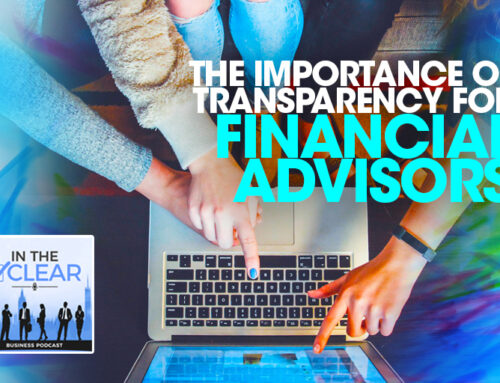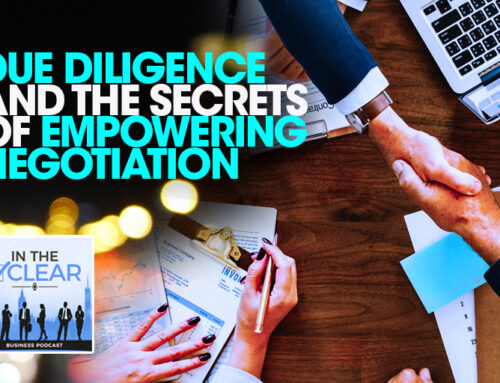Listen in as Clear Directory Founder Justin Recla tackles the very popular and misunderstood business question: What is Due Diligence?
Welcome to the In the Clear podcast, I’m your host, Justin Recla and today I’m gonna tackle a question that we get quite often, and that is, “What is due diligence?” Now for most people to understand, due diligence in the business world means that your lawyers looked over the contract, your CPAs looked over the financials. But really, at the core of due diligence, it really applies across the board in everything that you do
And it really just means to fully examine something, to make sure you really understand what’s going on, regardless of the situation. Now in the business world, it used to be the just the contracts and the financials. But unfortunately, because of the advent of the Internet, anybody and everybody can be a self- proclaimed expert, and everything could look really good, and documents could be made up. And I get it, folks, it may sound like it’s a bit of a conspiracy theory, but we literally see the underbelly of the business world. And the amount of fraud and scam that exist out there is huge, and the people that are actually taking money from good folks are counting on the fact that most people are that are gonna solely rely on looking at a website, or reading a profile somewhere.
And then if you get a chance to actually talk to them, and they become really good at selling people. Because most entrepreneurs, anyways, will make emotional decisions, and not decisions from a place of fully examining whatever the opportunity is. So what we like to do, is we like cover and teach about due diligence from the people perspective, and recognizing that you have to take the people into the considerations as well. It’s not just fully examining business history and business practices, but it’s also having an understanding of who the people are, what it is that they’re doing. It’s a really neat place to sit in, when you can look at an opportunity, or a business opportunity, or a service provider from that place, because when you add the two-layer process, it really removes any type of emotional decision-making from that process. It really puts a mechanical measure in place that it’s not personal if you don’t go working somebody. It’s literally just business.
And so those two levels are intuitive due diligence, and mechanical due diligence. And really, you have to do both. Most people who get burnt, whether it be in business or relationships, whatever it may be, is because they only typically make a decision from that emotional place, the intuitive place. The intuitive due diligence of, “Well, I really like them. They really like me, and there’s no way on God’s green Earth that they would take advantage of me.” Or the opportunity is so good, we see this often with new multilevel marketing opportunities, new business opportunities. The cryptocurrency right now is rife with all sorts of fraud and scam, and opportunities that there’s no people behind. It’s just a funny looking website, and there’s an opportunity for you to make money at it, and a may be convoluted and so forth.
But regardless, it’s preying off of that emotional response of people want to make money. The scamsters and fraudsters know this, they tug on the strings with some of the content that they write, and poof, people make emotional decisions. And we see it all the time, we’ve talked to clients that have lost out on $5000, we’ve got clients that come to us after the fact they’ve lost $500,000. It just doesn’t matter, because every single one of those decisions, in retrospect, was made from an emotional decision place. And so by adding a layer of mechanical due diligence, and not just looking at the contracts and the financials, but really, fully assessing the people involved as well. Looking at their success, looking at their reputation, look at the types of businesses that they’ve run in the past, looking at is the level of their lifestyle congruent with the level of success that they say they have. Is their reputation matching up with the level of success that they have?
And by all means, you still have to do that intuitive piece, you still gotta get along and like the person. But really, at the end of the day, you’re best served to fully examine the entire opportunity, from a place of full due diligence. So when we get back from the break, we’re gonna dive into this little bit further. We’re gonna actually go over some of the steps that you can use when looking at somebody. We’ve been talking about what is due diligence, and when we get back from the break, we’re gonna go into this a little bit further. Stay tuned.
Welcome back to the In the Clear podcast, I’m your host, Justin Recla and if you’re just tuning in, we are discussing the concept of … Well, actually we were going over the question, “What is due diligence?” And it’s super, super confusing for some people. A lot of people out there get lost in it, and like we were talking about before the break, that’s because decisions are typically made from that emotional place, an emotional space. What we were talking about prior to the break was literally removing the emotional aspect and making educated decisions because you have a due diligence process, you have a mechanical layer of your due diligence that you have that is there to safeguard you from your decision-making process.
And here’s the thing: if you don’t have somebody that can do a bit of critical thinking on your team, who can remove themselves from the scenario, then bring somebody into your team that can do that. We actually love playing that role for our clients, because we’re not emotionally attached to the business, we’re not emotionally attached to the project. And because you’re our client, our attachment is to protecting you and making sure you have your best interest in mind, and that you have all the information you need to make an educated decision about somebody. So here are some of things you can do to really help mitigate that risk. Again, by all means, you still have to do that intuitive piece, you still have to like the person, because you never know. Three months down the road, three weeks down the road, you find out the person’s a jerk, and it just is not a good fit anyways.
So once that piece is done, you’re ready to move forward, before you put pen and paper down, ask yourself: what you know about the person? What do you need to know? Let’s go back over that again. What do you know about the person, what you need to know, and how do you know it? That seems very simple, but those are really the three things. If you stop and ask yourself, what I know about this person, or this business, or this opportunity. And if all you know is what the person’s told you, or what you’ve read on the website, you don’t have enough information, just as simple as that. Because that’s essentially a single source that you’re getting that information from, and especially if you’re gonna be investing a decent amount of time and money into something, making sure that you’ve got additional resources to get get your information from is essential, if you’re gonna make that educated decision.
Really dive down, do that critical thinking piece. What do you know? How do you know it? What do you need to know to move forward? And then once you’ve identified what you need to know, literally now go back to the person and ask them, ask them those questions, but ask them in such way that it actually gives you some information that can be verified. You can’t just ask yes or no questions, you have to ask questions that actually give you answers, quantifiable answers, or people that you can talk to, websites that you can visit, examples of work and so forth. And then go verify that they’ve actually done what they say that they’ve done, with who they said that they’ve done it with, and get some additional feedback.
And here’s the beautiful thing: a lot of people think it takes a lot of time, a lot of effort to do due diligence. It doesn’t, folks. Google is your friend, the Internet is vast. You’ve just gotta know what to search for. Throw the person’s name and business name with word fraud or scam. And I get it, again, it seems like it’s super, super simple, but it’s a step that is so overlooked, that you will save yourself so much time and money if you do a little bit of due diligence on the front end, because it’s always, always cheaper than cleanup on the backend.
And here’s the thing: if you don’t know what questions to ask, pick up the phone, give us a call. We offer free consults all the time, and if it’s something you go super deep on, by all means, we can assist. But often times, I can get you pointed in the right direction by just saying, “Hey, have you asked this? Have you asked that?” Go ask those questions, and typically you’ll get the answers need to make a decision whether or not you want to move forward or not. And then if you decide that you really would like peace of mind, by all means, we can assist you further there.
But the last thing I want to know is, is that you’re out there, you’re not doing your due diligence, and all you had to do is ask a few simple questions. And ultimately, at the end of the day, trust your intuition. It’ll serve you well ,because oftentimes you’re pick up on those non-verbal skills or non-verbal cues, that just tell you that there’s something off with somebody that’s not full on the up and up. Trust that, it will serve you well, it’ll save you a lot of time, and money, and heartache in the long run as well. But still, make sure you do the mechanical due diligence as well, because it’s just as important.
And here’s the beautiful thing: if you’re completely unsure which direction to move, we’ve got quite a few service providers in the Clear business directory, at clearbusinessdirectory.com, and we’ve already vetted them for you. We’ve already done the work for you, so make sure you take a look at all the service providers and members of the Clear business directory, as we have fully vetted everyone for frauds and scams. You can actually go online and read their transparency report, so take a look. And to that point, if you’re really wanting to expedite trust with your prospective clients, and really get away from the Better Business Bureau model, with that A+ rating and you don’t want peer reviews, we don’t rank businesses. It’s sheer transparency and authenticity, and we don’t … No complaints, and literally just who you are, what you’ve done, and how you show up in the world so you can connect with your prospective clients and expedite that trust process.
So again, we’ve been talking about what is due diligence. If you’re still unsure as to when you need due diligence, give us a call, shoot us an email at clearbusinessdirectory.com. And until then, before you get a moment anyway, make sure you want to save yourself some time and money, make sure that business is in the Clear directory. Take care folks, we’ll talk to you soon.
Podcast: Play in new window | Download



